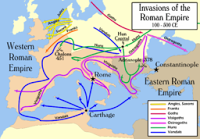All Things

- Dark Benediction
Walter M. Miller Jr.Walter M. Miller Jr. was an American author of science fiction, known for a single book that has become a classic: A Canticle for Leibowitz, possibly one of the best science fiction novels of all time, at least among those in the apocalyptic...
- The Sin Of The Scientist
Isaac AsimovIn an article published in 1969 with the same title as this one, Isaac Asimov argued that science should be subject to ethical constraints, and analyzed several cases in which a scientific discovery could be considered morally unacceptable....
- The Scientific Work Of Stephen Hawking
The scientific work of Stephen Hawking has been quite productive, although the media, influenced by his sad personal situation, tend to exaggerate its importance, putting him sometimes at the level of Einstein. His most renowned works are the following:The...
- Science, Ethics And Democracy
John Boyne?s novel, The boy in the striped pajamas (2007) is about the slaughter in the gas chamber in the Nazi concentration camps. The book ends thus:Of course all this happened a long time ago and nothing like that could ever happen again. Not in this...
- Consequences Of Scientific Fraud, A Lesson For Politicians
Scientific fraud is an important issue that can give rise to complex ethical problems. The mystery novel Gaudy night (1936), by Dorothy L. Sayers, offers a concrete example. When he is about to defend his doctoral thesis, a scientist discovers a little-known...
All Things
The end of science
 |
| Servers at LAAS by Guillaume Paumier Licensed under CC BY 3.0 via Wikimedia Commons |
In my previous article I wrote this: perhaps our scientific civilization won?t endure beyond this century. This is what I mean by the title of this article (the end of science), rather than the possibility that science is over because it has already discovered everything that can be discovered, which is very unlikely, as I pointed out in another post.
Science has been an integral part of our civilization for centuries, more than is usually believed, for scientific activity was already palpable during the Middle Ages. Isn?t it absurd to predict that such activity can be ended? How might this happen? Here I propose a few, far from exhaustive considerations:
 |
| Biology laboratory by Eduardo Bloomington, IN - lab. Licensed under CC BY-SA 2.0 via Wikimedia Commons |
- The bureaucratization of research: Although there are now more researchers than ever before, it is increasingly difficult to qualify the results of their investigations. We are witness to a worldwide unstoppable trend toward the simplification of these qualifications, through concepts such as the h and i10 indexes and their automatic calculation, using tools like Google Scholar, which depend on the number of citations of published articles. Research conducted during 2013 found how easy it is to trick Google Scholar.
- The irrepressible urge to publish: As researchers are automatically qualified by the number of items they publish and their impact indexes, they are under pressure to publish as much as possible. This often has the consequence that the research results are not published together, but divided into several items, which diminishes their quality and makes difficult the overall understanding of the results.
- The shift of the financial burden: Traditionally, the economic cost of published papers was taken over by the publishers of scientific journals, who reimbursed it by charging their readers. Today, with arrival of the everything-free culture, many journals require authors to pay before their articles are published, so we are in Kafkaesque situation that the same researchers who are pressured to publish many articles must pay for their publication. This trend has begun to spread to serious scientific publishers with great influence, although in some cases it remains optional, and is presented as the condition for open access of the papers (i.e., so that the papers can be consulted free of charge by the readers).
- Constructivism: Radical movements of environmentalist, feminist or Afro-centrist trends (between others) argue that science is a social construction, determined by the culture in which it was born, and propose that all the accumulated scientific heritage be destroyed, to begin again under other circumstances (each movement has its own proposals).
- Democratic epistemology: The idea that the fundamental principle of democracy (the predominance of the most widespread opinion) should apply to all branches of human life, including science, can have dire consequences for scientific activity. In science, what matters is the truth, not the number of people who think a certain way. But of this I have spoken in another article.
- The loss of our roots: Western science arose in a Christian cultural environment that imposed a linear view of history and enabled the emergence of the idea of scientific progress. This is a unique vision: in all the classical civilizations (Egypt, Mesopotamia, India, China, and even Greece) dominated a cyclical view of history, not well suited to the idea of progress. In recent times we are witnessing a loss of those roots that even doubts the very existence of truth, the foundation of science. Until now, the scientific and technological development has proceeded thanks to the momentum gained, but can we ensure that this trend will continue indefinitely, despite the undermining of its fundamental principles?

In the Roman Empire, during the third and fourth centuries, nobody imagined that the end of their civilization was near. While the Roman society became increasingly bourgeois, the least desirable jobs (including military service) were relegated to immigrants, who were then called barbarians, meaning foreigners. The beginning of the end, which came in the first decade of the fifth century with the sack of Rome by the hosts of Alaric, took by surprise almost everyone in the Empire. We should not be so certain that history cannot be repeated.
The same post in Spanish
Manuel Alfonseca
- Dark Benediction
Walter M. Miller Jr.Walter M. Miller Jr. was an American author of science fiction, known for a single book that has become a classic: A Canticle for Leibowitz, possibly one of the best science fiction novels of all time, at least among those in the apocalyptic...
- The Sin Of The Scientist
Isaac AsimovIn an article published in 1969 with the same title as this one, Isaac Asimov argued that science should be subject to ethical constraints, and analyzed several cases in which a scientific discovery could be considered morally unacceptable....
- The Scientific Work Of Stephen Hawking
The scientific work of Stephen Hawking has been quite productive, although the media, influenced by his sad personal situation, tend to exaggerate its importance, putting him sometimes at the level of Einstein. His most renowned works are the following:The...
- Science, Ethics And Democracy
John Boyne?s novel, The boy in the striped pajamas (2007) is about the slaughter in the gas chamber in the Nazi concentration camps. The book ends thus:Of course all this happened a long time ago and nothing like that could ever happen again. Not in this...
- Consequences Of Scientific Fraud, A Lesson For Politicians
Scientific fraud is an important issue that can give rise to complex ethical problems. The mystery novel Gaudy night (1936), by Dorothy L. Sayers, offers a concrete example. When he is about to defend his doctoral thesis, a scientist discovers a little-known...
